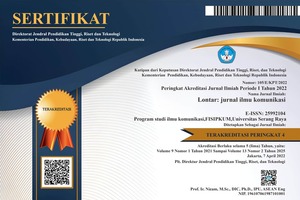IInterpretasi Dan Makna Kritik Sosial Dalam “Komik Strip Untuk Umum (Kostum)†Periode 1 Desember – 31 Desember 2017
DOI:
https://doi.org/10.30656/lontar.v6i2.949Abstract
Theres many ways can be done to appreciate the voices of messages and criticisms through creative ways, one of them through comics. One of the Indonesian comic artists who used comics as a medium of social criticism was Haryadhi through his "Komik Strip Untuk Umum (KOSTUM)†creation. KOSTUM Comics record the events that are happening and pour them into comic strips spread through social media. This research is a qualitative descriptive type using Roland Barthes' semiotics theory with two-stage significance (two orders of signification). From the results of the study, researchers found the implicit meaning that is to criticize and satirize the behavior of Indonesian people in a subtle way. Criticism expressed to comics is directed directly at the actors but is delicately wrapped with humorous portrayals through their characters. From the KOSTUM comics examined can be concluded that the social criticism described in the comic is an expression of the condition of the community related to the values that are used as a guideline for living in community groups.Keywords: Comics, Social Criticism, Semiotics, Roland Barthes
Downloads
Published
Issue
Section
License
By submitting an article to the journal, the author(s) agree to transfer the published article's copyright to the journal, which will act as the publisher. This means the journal will have the right to publish the article in various forms, including reprints. The journal will maintain the publishing rights to the published articles.
In line with the license, authors and third parties (readers, researchers, and others) are allowed to share and adapt the material. In addition, the material must be given appropriate credit, provided with a link to the license, and indicated if changes were made. If authors remix, transform, or build upon the material, authors must distribute their contributions under the same license as the original.






